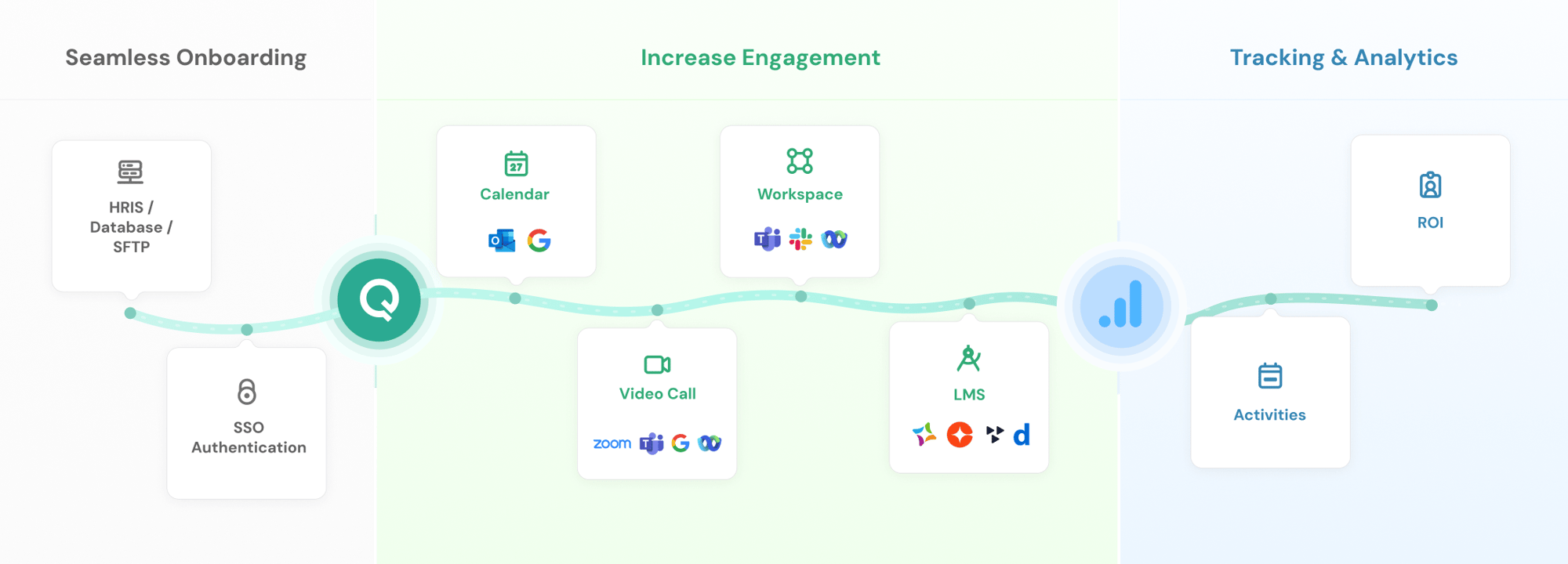7 Key Features of Mentorship Software
 Omer Usanmaz
·
5 minute read
Omer Usanmaz
·
5 minute read
Mentoring software is an essential tool for modern organizations looking to foster relationships between mentors and mentees. By utilizing digital platforms, mentoring software has improved the mentorship process, making it more accessible and efficient for both parties. By providing tools for mentor-mentee matching, communication, progress tracking, and feedback, these solutions create an environment where mentoring can thrive. This advancement has transformed the traditional mentorship landscape, allowing for broader reach, flexibility, and adaptability tailored to individual needs. The platforms often offer user-friendly interfaces, facilitating easy navigation for users, and incorporate cutting-edge technologies to enhance engagement. This article will delve into the key features of mentorship software that make it invaluable to organizations aiming to encourage professional growth and development.
1. Mentor-Mentee Matching
The foundation of any effective mentoring program lies in the productive mentor-mentee pairing. Utilizing sophisticated mentor matching algorithms, mentorship software facilitates mentor mentee matching that aligns with the skills, goals, and preferences of both parties. These algorithms analyze a plethora of data points to ensure that the most suitable pairing is made for mentors and mentees, which greatly increases the likelihood of a mutually rewarding experience. This ensures that both mentor and mentee parties maximize the benefits of the mentor match and mentorship relationship, as they are more likely to have a compatible and productive mentor matching partnership, ultimately fostering personal and professional growth.
See how Qooper’s smart algorithm improves mentor-mentee pairing.
2. Communication and Collaboration
Effective communication and collaboration are crucial components of a thriving mentorship relationship. Flexible communication channels within the mentoring software allow mentors and mentees to interact freely, fostering open dialogue and the sharing of valuable insights. Integrated calendars and scheduling systems also assist in coordinating mentoring sessions, ensuring both parties can easily plan and commit to meetings while respecting each other's time. These tools enhance collaboration and allow for a more structured relationship, promoting consistency and reliability in interactions, which are fundamental in building trust and achieving mentorship goals effectively.
Mentorship Communication Plan Template
3. Progress Tracking and Reporting
To monitor mentorship success, mentorship software provides comprehensive reporting tools that meticulously track the progress of the mentoring relationship. Mentorship software offer detailed insights into how effectively goals are being pursued and met. Regular updates and performance analytics for mentoring ensure both mentors and mentees remain on target with their objectives, enabling proactive adjustments to strategies where necessary. Goal tracking in mentoring software helps highlight areas of improvement and recognize achievements, which play a critical role in keeping both parties motivated and focused on continued development.
Curious about how Qooper tracks mentoring success?
4. Customization and Flexibility
One size does not fit all, and a successful mentoring program allows customizable mentoring workflows, offering flexibility to design and implement a corporate mentoring solution that aligns with your organization's culture. This adaptability ensures that mentorship initiatives are relevant and effective across various contexts. By supporting personalized mentorship experiences, the software caters to diverse learning preferences, making it possible for mentors and mentees to achieve their goals while fitting seamlessly into company processes.
5. Integration with HR Systems
For ensuring smooth operations, mentorship software features integration and data management capabilities. Integration with existing systems allows for easy management of participant information, including onboarding details and ongoing updates, tracking of metrics such as engagement and progress, and automated workflows like enrollment and scheduling notifications. By working harmoniously with HR systems, mentorship programs can operate more efficiently, reducing administrative burdens and providing insights that support broader organizational objectives, ultimately contributing to enhanced program visibility and strategic alignment.
To explore more on how mentoring software integrates with other systems,
read our blog: Mentoring Software Integrations.
6. Improved Engagement and Retention
Mentoring programs are a proven strategy to improve employee engagement and employee retention by offering guidance and support tailored to individual growth paths. By fostering strong mentor and mentee connections through personalized mentorship experiences, organizations can increase retention rates and cultivate a more committed and motivated workforce.
This environment encourages active participation, prompting employees to contribute more effectively to team efforts. This increased engagement often results in improved productivity and loyalty among employees, enhancing the overall workplace atmosphere.
Learn more about how communities and groups support engagement and retention in mentoring programs here.
7. Feedback and Evaluation
Integrated feedback tools are essential for evaluating the effectiveness of mentoring programs. These tools offer a structured platform where mentors and mentees can openly discuss their progress and challenges, fostering a transparent environment.
The software facilitates regular performance reviews, enabling mentors and mentees to provide and receive constructive feedback efficiently. This continuous evaluation helps identify areas for growth and ensures the ongoing improvement of the mentoring experience, ultimately enhancing the overall quality and success of the mentorship program.
Help your employees learn from meaningful connections within the enterprise.
Short-term and long-term connections to help with onboarding, career conversations, upskilling, and job-specific learning are explored further in our Learning Solutions.
Conclusion: Maximizing Mentorship Program Success
By incorporating these key features, the mentoring platform becomes an indispensable tool for organizations looking to nurture talent, goal setting, promote personal and professional growth, and build a culture of learning and development. Embracing mentorship technology can lead to transformative outcomes, making a significant difference in employee satisfaction and organizational success.
Key Takeaways
- Mentoring software enhances modern mentorship programs by making them more accessible, scalable, and efficient through digital tools.
- Smart mentor-mentee matching algorithms ensure compatibility based on skills, goals, and preferences, improving relationship quality and outcomes.
- Built-in communication tools and scheduling features promote consistent, productive, and flexible mentor-mentee interactions.
- Progress tracking and reporting capabilities help monitor goal achievement, identify areas for improvement, and keep participants motivated.
- Customization and flexibility allow organizations to tailor mentoring workflows to fit their unique culture and needs.
- Integration with HR systems simplifies data management, automates processes, and aligns mentorship programs with broader organizational goals.
- Enhanced engagement and retention result from personalized mentoring experiences that support career growth and increase employee satisfaction.
- Feedback and evaluation tools encourage continuous improvement through structured performance reviews and open communication.
- Mentoring platforms support a culture of learning and development, contributing to long-term organizational success.
Frequently Asked Questions
What are the 4 Cs of mentorship?
Effective mentorship, the cornerstone of personal and professional growth, is characterized by the four pivotal Cs: Counsel, Correction, Connection, and Champion. These key mentoring principles serve as the bedrock upon which it thrives.
For a detailed guide on understanding how these 4 Cs contribute to achieving the objectives of effective mentorship, read the full article here.
How to create a successful enterprise mentoring program
Enterprise mentoring fosters growth and development by pairing experienced mentors with junior employees. This relationship helps improve skills, set career goals, and align with company objectives, ultimately boosting productivity and retention.
Benefits of Enterprise Mentoring:
-
Supports employee onboarding and skill development
-
Enhances job performance and understanding of company culture
-
Builds future leadership and strengthens employee engagement
Key Steps for Implementation:
-
Define clear program goals and objectives
-
Effectively promote the program to engage mentors and mentees
-
Select suitable mentors and mentees based on skills and needs
For a detailed guide on how to create and implement a successful enterprise mentoring program, read the full article here
What are the factors to consider when choosing mentoring software?
The mentoring software market has grown rapidly over the past few years — and with so many options available, knowing what to look for is key.
We’ve identified 14 critical factors to consider when evaluating mentoring platforms:
-
Onboarding
-
Program Design
-
Launch Support
-
Mentor Matching Options
-
Mentor-Mentee Training
-
Relationship Facilitation
-
Structural Flexibility
-
Progress Tracking
-
Reporting & ROI
-
Integrations
-
Global Readiness
-
Mobile Accessibility
-
Teams/Slack Compatibility
-
Enterprise-Grade Security
Each of these elements plays a role in the success of your mentoring initiative.
👉 Check the article to explore what each factor entails and see which mentoring platforms stand out.
Top 10 online mentoring software
There are many criteria to consider when choosing the right mentoring software, from matching algorithms to scalability. To help you decide, we’ve rounded up the top 10 platforms: Qooper, Together, MentorcliQ, Chronus, Mentorloop, PushFar, MentorCity, Guider, River, and Art of Mentoring.







.jpg)
.jpg)
